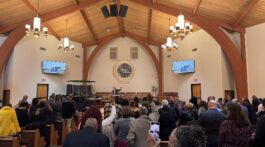Rather than repeating and intensifying the debate over women’s ordination, we can move forward together by focusing on something which we have lost: a common understanding of our identity and purpose as a movement. Identity is one of the three great questions: Who Am I? (Identity). Why Am I Here? (History). Where Am I Going? (Destiny). These three questions, and their answers, are intertwined, like the braided strands of a rope. Understanding our Identity arises out of Why We Are Here and Where We Are Going.
For example, the belief that we are here as the result of a train of accidents, and will, at the end of this life, return to nothingness–atheism–is a natural identity. When it comes to Seventh-day Adventists, then, we are singularly blessed, for our name contains hints at the two end-points. “Seventh-day” says, in part, we are here because God created us, and the Sabbath for us. “Adventist” points to the return of Jesus. So, in its simplest form, we are a people created by God, and awaiting His return. But there is much more to be mined from those simple statements.
The existence of the Sabbath as a time for communion with God tells us that God created us to be in a relationship with Him. Genesis 3 tells us we severely damaged that relationship; indeed, without divine intervention, that relationship would have been eternally severed. And that relationship is as essential to our lives as the blood in our veins or the air we breathe. “In him,” that is, God, the apostle Paul tells us, “we live, and move, and have our being” (Acts 17:28). So, had we been separated from Him, no longer “in him,” we would no longer “have our being.” We would die.
So our Destiny consists of two alternatives: either returning to that relationship with God, or ceasing to exist. That’s why we say that salvation means having a saving relationship with God. But we have a problem, in that, after speaking of such a relationship, we immediately return to speaking in legal terms. In fact, “justification” and “sanctification,” terms that Paul uses to explain salvation, were legal terms used in the courts in his day.
This demonstrates a weakness in our theological discussion. If we intend to truly pursue the idea of a saving relationship with God, then we will have to use relational terminology and relational concepts rather than legal ones.
In fact, when we look at it, we realize that laws exist because relationships fail. Let me demonstrate.
In my state there are laws that dictate when and how divorces can take place. But I have no idea about the particulars of these laws, for one simple reason: my wife and I have a strong marriage, and we have no desire for, or intent to, divorce. Since our marriage relationship is strong, we have no need of divorce law. Should our relationship get into trouble, then we would become interested in and involved with the legal requirements.
We could go on and on like this. For example, contract law exists to regulate business relationships, but only becomes active in cases where that relationship breaks down or comes into question. So long as the relationship remains strong, the contract is superfluous.
This explains a remark by Ellen White that the angels of heaven were not aware of the law before Lucifer’s fall. In relational terms, that makes perfect sense. So long as they enjoyed a trusting relationship with God the Father, there was no need to enunciate the rules by which that relationship could be maintained. But when Lucifer rebelled, sowing doubt, suspicion and distrust in others, then it became necessary to make explicit the previously unspoken rules.
So we see that rules exist to safeguard and to deal with the breakdowns in relationships. At the same time, although they do give some general guidance as to how a healthy relationship can be maintained, they still are primarily concerned with negatives, with behaviors that destroy relationships. Laws focus on behavior, because that can be observed; they cannot deal very effectively with attitudes, which are less subject to observation. In a broken world, a world of broken relationships, laws necessarily focus on behaviors which break down and destroy relationships.
Finally, Jesus himself testified that the purpose, the foundation of the Law itself, is relationships. When asked about the greatest commandment, he stated two, neither of which were listed in the Decalogue: you shall love the Lord with all your being, from Deuteronomy 6; and love your neighbor as yourself, from Leviticus 19.
So the law itself is based upon the need to restore these loving relationships!
The Ten Commandments do for these relationships what divorce law does concerning marriage: it describes and prohibits behaviors which undermine trust and betray love. But having a strong marriage is more than simply not having an affair. It is more than not abusing one another. And loving God is more than not worshiping idols and the rest; loving your neighbor is not simply refraining from murder, theft, adultery, and the rest. Those are the legal descriptions of behaviors that destroy those relationships.
If we want to transition from a legalistic understanding of salvation to a relational understanding of salvation, we must develop a different vocabulary, a different set of concepts. We’re going to have to develop a series of concepts which explain how to build strong relationships, rather than really focusing on how not to break them down.
That is perhaps the most alarming thing about the events in San Antonio. It is not that we disagree vigorously on certain topics; it is that those disagreements have revealed a breakdown of relationships. Declarations about “rebellion” on the one hand, or “lack of compassion” on the other expose attitudes not compatible with loving one another selflessly. That is the bad news.
The good news is that Jesus is in the business of restoring relationships and, if we are truly His church, then that is our business, too. The way back–together–is the only real way back. And as we pursue that path, of understanding and building positive relationships, we will find our true identity, our true purpose, and like the disciples in the upper room, once we are all of one accord, differences of opinion will fade, as we go about fulfilling our purpose as a light to the world.
In following posts, we will look at Salvation, and Adventist Identity, in terms of relationship.
Read other posts from this series on Adventist Identity.










